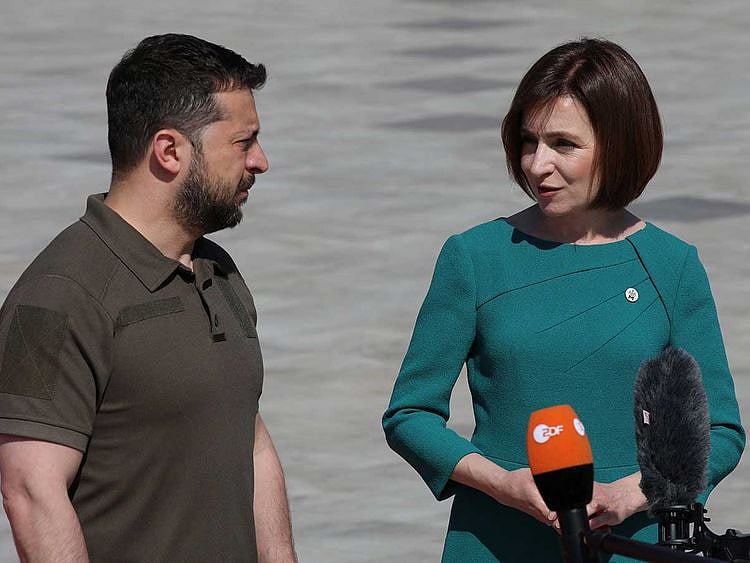European summit opens in Moldova with Ukraine war, regional conflicts on agenda
EU wants to use the summit to reach out to Eastern European countries

Bulboaca: Ukrainian President Volodymyr Zelenskyy took his quest for more arms and support to a sprawling summit of some 50 European leaders in Moldova on Thursday, becoming the focal point of an event that seeks to quell regional conflicts and shore up unity in the face of Russia’s war.
The meeting of the pan-continental European Political Community, which embraces all European nations other than Russia and Belarus, gathered the heads of state and government from 47 countries but its attention was on the continent’s south and east — a region pushed to a turning point in its relationship with Moscow because of Russia’s invasion of Ukraine last year.
The 27-nation EU wants to use the summit to reach out to many Eastern European countries that spent decades either within the Soviet Union or under its immediate sphere of influence, and to bolster the continent’s unified response to Russian aggression.
The choice to hold the summit in Moldova, a former Soviet republic of around 2.6 million people, is seen as a message to the Kremlin both from the EU and the pro-Western Moldovan government, which received EU candidate status in June of last year at the same time as Ukraine.
As he arrived, EU foreign affairs chief Josep Borrell noted the significance of the summit’s location, only around 20 kilometers from Ukraine’s border.
“It’s important that this message reaches Russia,” Borrell said. “Russia is not here, not because we don’t want to invite Russia, but because Putin’s Russia was excluded from this community by launching this attack, this war — unjustified — against Ukraine.”
Moldova, Europe’s poorest country which is cradled by Ukraine on three sides, aspires to join the EU by the end of the decade, and has consistently signalled its support for Ukraine and taken in refugees fleeing the war.
Zelenskyy was the first foreign leader to arrive at Thursday’s summit venue, a 19th-century castle and vineyard around 35 kilometers from the capital, Chisinau. Dressed in his trademark olive green shirt and cargo pants, he thanked the Moldovan people for hosting Ukrainian refugees, and said both Ukraine and Moldova were destined to work “shoulder to shoulder” for EU membership.
“What is very important: our future in the EU,” he said, adding that his country is ready to enter NATO whenever the Western military alliance is ready to accept it.
“Security guarantees are very important, not only for Ukraine, but for our neighbours, for Moldova, because of Russian aggression in Ukraine and potential aggression in other parts of Europe,” Zelenskyy said.
Other summit participants include German Chancellor Olaf Scholz, French President Emmanuel Macron and UK Prime Minister Rishi Sunak.
Scholz and Macron will join European Council President Michel for one of the summit’s major meetings: discussions with the leaders of Armenia and Azerbaijan, two former Soviet Caucasian neighbour nations that have fought wars over a contested territory.
That territory, Nagorno-Karabakh, was the site of a conflict between Armenia and Azerbaijan in 2020 that killed more than 6,000 people. The war ended in a Russia-brokered armistice under which Armenia relinquished territories surrounding the region.
Nagorno-Karabakh lies within Azerbaijan, but ethnic Armenian forces backed by Armenia had controlled the region and surrounding territories since 1994. Recent negotiations between the two nations over the territory have raised hopes that a breakthrough could come at the Moldova summit.
Another lighting rod will be the recent flareup in ethnic tensions between neighbouring Serbia and Kosovo, whose leaders arrived at the summit Thursday morning. NATO has announced it will send 700 more troops to northern Kosovo to help quell violent protests after clashes with ethnic Serbs there left 30 international soldiers wounded this week.
The latest violence in the region has stirred fear of a renewal of the 1998-99 conflict in Kosovo that claimed more than 10,000 lives, left more than 1 million people homeless and resulted in a NATO peacekeeping mission that has lasted nearly a quarter of a century.
Sign up for the Daily Briefing
Get the latest news and updates straight to your inbox
Network Links
GN StoreDownload our app
© Al Nisr Publishing LLC 2025. All rights reserved.